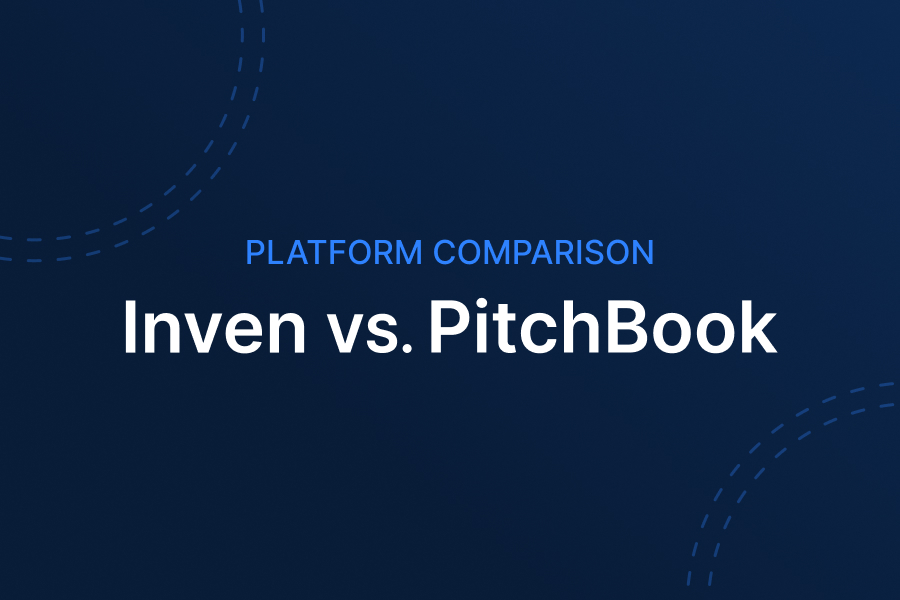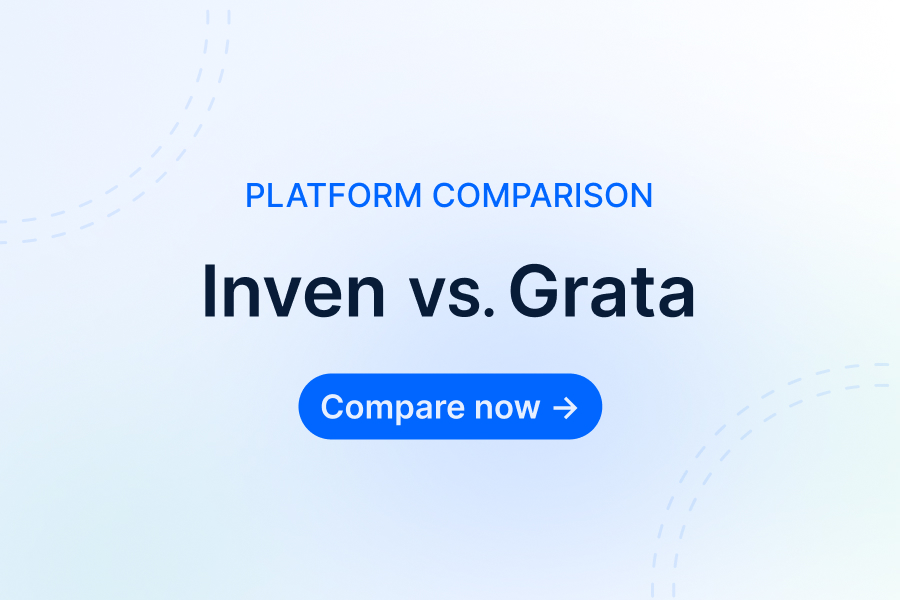Comparing Inven and PitchBook
Choosing the right deal sourcing platform can reshape how M&A teams uncover opportunities, particularly in the middle market. This comparison breaks down how Inven and PitchBook differ across features, coverage, accuracy, usability, and AI capabilities.
Key Takeaways
- Coverage: Inven tracks 21+ million companies globally, while PitchBook lists around 5.3 million companies with an emphasis on financially backed firms and investment data.
- Platform differences: Inven specializes in early discovery and niche lower and middle market company sourcing through AI, natural-language search, and intent-to-sell insights. PitchBook centers on transaction, fund, and valuation data curated by analysts, offering strong financial detail but requiring more manual filtering and interpretation.
- Accuracy: Inven combines millions of datapoints worldwide in multiple languages, providing granular, continuously updated data and insights. PitchBook’s analyst-curated model delivers high accuracy, but its company coverage grows more slowly as it depends on analyst curation. Inven’s proprietary algorithms have achieved 93% accuracy in search results while covering over 16 million more companies than PitchBook, enabling users to find more relevant companies without compromising precision.
- Contact information: Inven integrates verified executive contacts for 430M+ professionals from multiple data partners directly into search results. PitchBook includes contact and executive details for 4M+ professionals, primarily linked to financed companies and transactions.
- Pricing: Third-party sources place the annual costs of PitchBook between $18,000 and $70,000 and pricing varies based on team size, company type, and add-ons, such as CRM integration and data access. For Inven, pricing is structured around packages designed for different team sizes. Inven pricing offers flexibility and competitive value, and the CRM integration and contact data for outreach is included in Inven plans.
- User experiences: “The best thing about Inven is its ability to find companies in niche areas that do not appear on platforms like PitchBook or with a general internet search. We also like the "Intent to Sell" feature."
– Investment Banking customer using Inven to find companies to target with outreach and potential buyers or investors for their clients, G2 review - Bottom Line: Both platforms deliver private market insights, but Inven’s AI-driven approach can give M&A teams faster visibility into niche, emerging companies and sectors not yet captured in analyst-curated databases.
Want to see the difference? Book a demo to experience how leading PE, investment banking, corporate development, and venture capital teams can accelerate their sourcing and find niche companies with Inven’s AI-native platform.
Overview: Inven vs. PitchBook – Approaches Explained
Both Inven and PitchBook are built to provide intelligence on private companies and the deal landscape. Inven excels at identifying, researching, and supporting outreach to target companies, while PitchBook’s strength lies in analyzing those companies once they’ve been identified.
What differentiates Inven and PitchBook?
PitchBook, founded in 2007 and acquired by Morningstar in 2016, has long been a benchmark in financial and investment data. PitchBook covers public and private company data, investor records, deal activity, and fund-level financials. It remains a strong choice for professionals focused on due diligence, fund performance, and deal tracking.
Inven, founded in 2022, represents a new generation of sourcing tools. As the first AI-native deal sourcing platform, it automatically discovers, connects, and enriches company data using machine learning. Inven identifies ownership, financials, investors, deals, and intent-to-sell signals in real time. Built for cross-border sourcing, Inven combines multilingual search, verified contacts, and CRM integration to help dealmakers uncover opportunities earlier and faster.
Inven and PitchBook both help M&A, PE, corporate development, and venture capital teams research and evaluate companies. PitchBook does this through supporting assessments with analyst-driven data and deal metrics. Inven enables proactive sourcing through automated intelligence that scales across data sources, regions, industries, and languages – allowing you to identify opportunities before others do.
Inven vs. PitchBook Pricing
Inven and PitchBook pricing varies based on the use case, number of seats, and selected add-ons. While exact pricing isn’t publicly listed, the price points can be compared based on customer reviews and shared market information.
How much does PitchBook cost?
PitchBook’s pricing is tailored to each organization’s needs, depending on the number of seats and data access levels. Specific pricing is not publicly listed. According to third-party reviews, plans typically start in the five-figure range annually for full-feature access, ranging from $18,000 to $70,000.
How much does Inven cost?
Inven pricing is structured around three packages designed for different team sizes and sourcing needs. The platform offers competitive pricing for smaller teams and flexible customization for enterprise clients.
“Inven is perfect in that it has surprisingly fantastic depth, a very nice AI tool to refine your searches, and the right price point. Easy to use, and customer support was always there when I needed.”
– Global Head of M&A using Inven to originate deals and access a deep database of companies, G2 Review
Book a demo with Inven to get personalized pricing and see which plan fits your sourcing needs.
Feature Comparison: Inven vs. PitchBook
If you’re deciding which provider fits your workflow, understanding the platform capabilities and where each one excels can help you make the right call.
Here's how Inven and PitchBook compare across the features that matter most to deal teams.
Prefer a quick view? See the standalone Inven vs. PitchBook feature comparison table.
The AI-Native Difference: Discovery Beyond Financial Databases
AI-native platforms like Inven have a clear edge over traditional systems. While traditional models rely on structured, analyst-curated data and predefined classifications, AI platforms learn continuously from real-world signals to surface emerging targets and trends earlier.
This adaptability gives M&A teams a broader and more current view of the private market landscape.
How does an AI-native deal sourcing platform differ from a financial data platform?
PitchBook’s strength lies in its verified financial and transactional coverage, which is a valuable resource for fund managers and analysts tracking deal flow, funding rounds, or valuations. However, because the model depends on disclosed or reported data, many private companies and early stage startups remain outside its dataset until after a transaction occurs.
Inven’s AI engine bridges that gap. By continuously scanning data from data provider partners, company websites, official registries, press releases, global web sources, and social signals in multiple languages, Inven surfaces private companies earlier in their lifecycle. This is often before they’ve appeared in any traditional database. This means that on top of offering insight into more established companies and their deal history, Inven can reach targets such as stealth ventures and early-stage startups founded by ex-FAANG talent by reading into a wide range of data and signals.
“The best thing about Inven is its ability to find companies in niche areas that do not appear on platforms like PitchBook or with a general internet search. We also like the "Intent to Sell" feature. The customer support is also fantastic.”
– Investment Banking customer using Inven to find companies to target with outreach and potential buyers or investors for their clients, G2 review
For dealmakers, the difference comes down to visibility:
PitchBook excels at analyzing known deals, Inven helps you find the next ones first.
Inven vs. PitchBook: User Experiences
PitchBook and Inven serve similar audiences across M&A, private equity, and corporate development, however the day-to-day experience using them differs.
What do PitchBook vs. Inven reviews reveal about the two platforms?
Professionals familiar with both AI-native platforms and traditional, analyst-driven databases often note clear distinctions in the type of value each provides. PitchBook is valued for its depth of financial and transaction data, while Inven is recognized for its ability to accelerate sourcing, uncover niche targets, build buyer lists, and help scale discovery globally.
The following excerpts from verified G2 reviews and Inven case studies highlight recurring themes shared by Inven users.
Coverage and Discovery:
“The breadth of coverage across industries and geographies on Inven is impressive. I can find companies in markets that other databases overlook.”
– Financial Services customer using Inven to provide reliable coverage on niche sectors, G2 Review
“Inven has a massive database with a number of new companies not found in competitors.”
– Venture Capital and Private Equity customer using Inven to source new M&A leads, G2 Review
Speed and Ease of Use:
“We go from nothing to a clean, enriched, and actionable list in just 15–30 minutes. With the integrations in play, we can start an outreach right away.”
– Investment Analyst at Lexar Partners, Inven Case Study
“The AI-guided search on Inven really shines when I need to put together market maps on short notice. It feels more dynamic than traditional databases.”
– Corporate Strategy Manager using Inven to quickly understand landscapes in new industries and identify potential acquisition or partnership targets, G2 Review
“In Inven, the AI assistant makes building lists much easier compared to traditional databases.”
– Private equity customer using Inven to identify proprietary deal opportunities and screen companies faster, G2 Review
Accuracy and Enrichment:
“The search experience is much more natural than traditional databases. It feels like working with an analyst who understands context.”
– Venture Capital and Private Equity customer using Inven to speed up the process of identifying investment opportunities and acquisition targets, G2 Review
“The combination of accurate company data and AI-assisted search on Inven makes it far superior to manual research or static databases.”
– Corporate Strategy Manager using Inven to reduce time spent on sourcing and avoid missing out on attractive targets, G2 Review
Future Outlook: Inven and PitchBook in 2025
In 2025, Inven raised a $12.75 million Series A round led by Ventech and Vendep Capital, marking a period of accelerated growth and product innovation. The company plans to continue expanding AI engineering, product capabilities, and global data coverage. Inven continues to grow with the goal of becoming the default platform for private market deal making.
PitchBook continues to evolve under Morningstar’s ownership. The platform is known for its financial analytics and investor data, emphasizing product stability and data validation. While some AI-assisted features exist within its research tools, there are no mentions of PitchBook promoting AI capabilities on their website.
Verdict: Is Inven better than PitchBook for deal sourcing?
Both platforms add value to the workflow of M&A professionals. PitchBook is a strong tool for deal reference and financial validation, but Inven is foundationally built for automated list building and deal sourcing.
When should you choose PitchBook over Inven?
PitchBook is a trusted resource for investment data, valuations, and fund analytics. It’s best suited for teams tracking existing deals, investors, or company financial histories. Oftentimes, it is not the main tool for proactive deal sourcing.
When should you choose Inven over PitchBook?
Inven is designed for sourcing deals. The AI-native system identifies private companies before they appear in financial databases, giving M&A, private equity, corporate development, and venture capital teams earlier and broader visibility into emerging opportunities. Wider coverage platforms like Inven enable mapping the entire market of potential investors, buyers, or acquisition targets.
PitchBook helps you analyze what’s already on the record.
Inven helps you discover what’s next – and act faster when it happens.
Final Takeaways
Inven helps dealmakers find companies others can’t – faster, globally, and with confidence. Internal benchmark testing shows that its search model delivers up to 97% accuracy on query results.
With proprietary data on 21+ million companies, advanced AI filters, and highly rated customer support (see G2 reviews), Inven offers a smarter, more adaptive way to source opportunities.
Ready to see the difference?
Book a demo to experience how leading PE, investment banking, venture capital, and corporate development teams accelerate sourcing with Inven’s AI-native platform.
Or read some more Inven success stories before making a decision.
Explore other comparisons:








